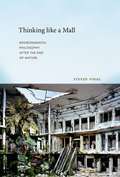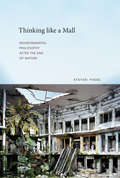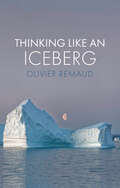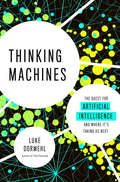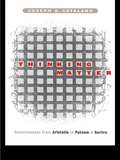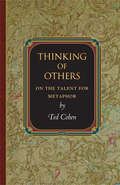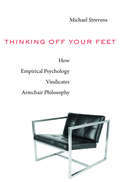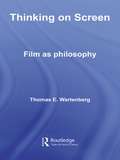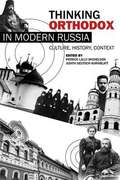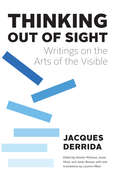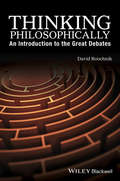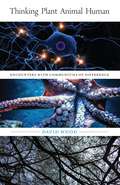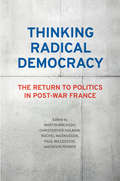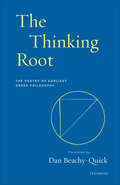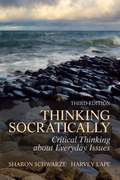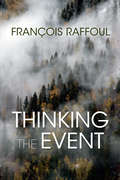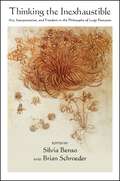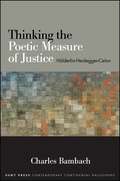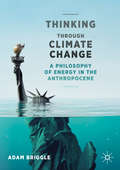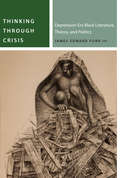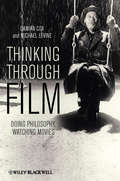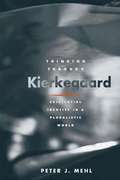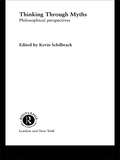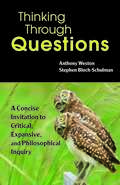- Table View
- List View
Thinking like a Mall
by Steven VogelEnvironmentalism, in theory and practice, is concerned with protecting nature. But if we have now reached "the end of nature," as Bill McKibben and other environmental thinkers have declared, what is there left to protect? In Thinking like a Mall, Steven Vogel argues that environmental thinking would be better off if it dropped the concept of "nature" altogether and spoke instead of the "environment" -- that is, the world that actually surrounds us, which is always a built world, the only one that we inhabit. We need to think not so much like a mountain (as Aldo Leopold urged) as like a mall. Shopping malls, too, are part of the environment and deserve as much serious consideration from environmental thinkers as do mountains. Vogel argues provocatively that environmental philosophy, in its ethics, should no longer draw a distinction between the natural and the artificial and, in its politics, should abandon the idea that something beyond human practices (such as "nature") can serve as a standard determining what those practices ought to be. The appeal to nature distinct from the built environment, he contends, may be not merely unhelpful to environmental thinking but in itself harmful to that thinking. The question for environmental philosophy is not "how can we save nature?" but rather "what environment should we inhabit, and what practices should we engage in to help build it?"
Thinking like a Mall: Environmental Philosophy after the End of Nature (The\mit Press Ser.)
by Steven VogelA provocative argument that environmental thinking would be better off if it dropped the concept of “nature” altogether and spoke instead of the built environment.Environmentalism, in theory and practice, is concerned with protecting nature. But if we have now reached “the end of nature,” as Bill McKibben and other environmental thinkers have declared, what is there left to protect? In Thinking like a Mall, Steven Vogel argues that environmental thinking would be better off if it dropped the concept of “nature” altogether and spoke instead of the “environment”—that is, the world that actually surrounds us, which is always a built world, the only one that we inhabit. We need to think not so much like a mountain (as Aldo Leopold urged) as like a mall. Shopping malls, too, are part of the environment and deserve as much serious consideration from environmental thinkers as do mountains. Vogel argues provocatively that environmental philosophy, in its ethics, should no longer draw a distinction between the natural and the artificial and, in its politics, should abandon the idea that something beyond human practices (such as “nature”) can serve as a standard determining what those practices ought to be. The appeal to nature distinct from the built environment, he contends, may be not merely unhelpful to environmental thinking but in itself harmful to that thinking. The question for environmental philosophy is not “how can we save nature?” but rather “what environment should we inhabit, and what practices should we engage in to help build it?”
Thinking Like an Iceberg
by Olivier RemaudWhen we imagine the polar regions, we see a largely lifeless world covered in snow and ice where icebergs drift listlessly through frozen waters, like solitary wanderers of the oceans floating aimlessly in total silence. But nothing could be further from the truth. This book takes us into the fascinating world of icebergs and glaciers to discover what they are really like. Through a series of historical vignettes recalling some of the most tragic and most exhilarating encounters between human beings and these gigantic pieces of matter, and through vivid descriptions of their cycles of birth and death, Olivier Remaud shows that these entities are teeming with many forms of life and that there is a deep continuity between iceberg life and human life, a complex web of reciprocal interconnections that can lead from the deadliest to the most vital. And precisely because there is this continuity, icebergs and glaciers tell us something important about life itself – namely, that it thrives in the most unexpected of places, even where there seems to be no life at all. At a time when we are increasingly aware that the melting of ice sheets, glaciers and sea ice is one of the many disastrous consequences of global warming, this beautiful meditation is a poignant reminder of the interconnectedness of all life and the fragility of the Earth’s ecosystems.
Thinking Machines: The Quest for Artificial Intelligence--and Where It's Taking Us Next
by Luke DormehlA fascinating look at Artificial Intelligence, from its humble Cold War beginnings to the dazzling future that is just around the corner.When most of us think about Artificial Intelligence, our minds go straight to cyborgs, robots, and sci-fi thrillers where machines take over the world. But the truth is that Artificial Intelligence is already among us. It exists in our smartphones, fitness trackers, and refrigerators that tell us when the milk will expire. In some ways, the future people dreamed of at the World's Fair in the 1960s is already here. We're teaching our machines how to think like humans, and they're learning at an incredible rate.In Thinking Machines, technology journalist Luke Dormehl takes you through the history of AI and how it makes up the foundations of the machines that think for us today. Furthermore, Dormehl speculates on the incredible--and possibly terrifying--future that's much closer than many would imagine. This remarkable book will invite you to marvel at what now seems commonplace and to dream about a future in which the scope of humanity may need to widen to include intelligent machines.From the Trade Paperback edition.
Thinking Matter: Consciousness from Aristotle to Putnam and Sartre
by Joseph S. CatalanoFirst published in 2000. Routledge is an imprint of Taylor & Francis, an informa company.
Thinking of Others: On the Talent for Metaphor (Princeton Monographs in Philosophy #37)
by Ted CohenIn Thinking of Others, Ted Cohen argues that the ability to imagine oneself as another person is an indispensable human capacity--as essential to moral awareness as it is to literary appreciation--and that this talent for identification is the same as the talent for metaphor. To be able to see oneself as someone else, whether the someone else is a real person or a fictional character, is to exercise the ability to deal with metaphor and other figurative language. The underlying faculty, Cohen argues, is the same--simply the ability to think of one thing as another when it plainly is not. In an engaging style, Cohen explores this idea by examining various occasions for identifying with others, including reading fiction, enjoying sports, making moral arguments, estimating one's future self, and imagining how one appears to others. Using many literary examples, Cohen argues that we can engage with fictional characters just as intensely as we do with real people, and he looks at some of the ways literature itself takes up the question of interpersonal identification and understanding. An original meditation on the necessity of imagination to moral and aesthetic life, Thinking of Others is an important contribution to philosophy and literary theory.
Thinking Off Your Feet: How Empirical Psychology Vindicates Armchair Philosophy
by Michael StrevensIn an original defense of armchair philosophy, Michael Strevens seeks to restore philosophy to its traditional position as an essential part of the quest for knowledge, by reshaping debates about the nature of philosophical thinking. His approach explores experimental philosophy’s methodological implications and the cognitive science of concepts.
Thinking on Screen: Film as Philosophy
by Thomas E. WartenbergThinking on Screen: Film as Philosophy is an accessible and thought-provoking examination of the way films raise and explore complex philosophical ideas. Written in a clear and engaging style, Thomas Wartenberg examines films’ ability to discuss, and even criticize ideas that have intrigued and puzzled philosophers over the centuries such as the nature of personhood, the basis of morality, and epistemological skepticism. Beginning with a demonstration of how specific forms of philosophical discourse are presented cinematically, Wartenberg moves on to offer a systematic account of the ways in which specific films undertake the task of philosophy. Focusing on the films The Man Who Shot Liberty Valance, Modern Times, The Matrix, Eternal Sunshine of the Spotless Mind, The Third Man, The Flicker, and Empire, Wartenberg shows how these films express meaningful and pertinent philosophical ideas. This book is essential reading for students of philosophy with an interest in film, aesthetics, and film theory. It will also be of interest to film enthusiasts intrigued by the philosophical implications of film.
Thinking Orthodox in Modern Russia
by Patrick Lally Michelson Judith Deutsch Kornblatt"Thinking Orthodox in Modern Russia" illuminates the significant role of Russian Orthodox thought in shaping the discourse of educated society during the imperial and early Soviet periods. Bringing together an array of scholars, this book demonstrates that Orthodox reflections on spiritual, philosophical, and aesthetic issues of the day informed much of Russia's intellectual and cultural climate. Volume editors Patrick Lally Michelson and Judith Deutsch Kornblatt provide a historical overview of Russian Orthodox thought and a critical essay on the current state of scholarship about religious thought in modern Russia. The contributors explore a wide range of topics, including Orthodox claims to a unique religious Enlightenment, contests over authority within the Russian Church, tensions between faith and reason in academic Orthodoxy, the relationship between sacraments and the self, the religious foundations of philosophical and legal categories, and the effect of Orthodox categories in the formation of Russian literature. "
Thinking Out of Sight: Writings on the Arts of the Visible (The\france Chicago Collection)
by Jacques DerridaJacques Derrida remains a leading voice of philosophy, his works still resonating today—and for more than three decades, one of the main sites of Derridean deconstruction has been the arts. Collecting nineteen texts spanning from 1979 to 2004, Thinking out of Sight brings to light Derrida’s most inventive ideas about the making of visual artworks. The book is divided into three sections. The first demonstrates Derrida’s preoccupation with visibility, image, and space. The second contains interviews and collaborations with artists on topics ranging from the politics of color to the components of painting. Finally, the book delves into Derrida’s writings on photography, video, cinema, and theater, ending with a text published just before his death about his complex relationship to his own image. With many texts appearing for the first time in English, Thinking out of Sight helps us better understand the critique of representation and visibility throughout Derrida’s work, and, most importantly, to assess the significance of his insights about art and its commentary.
Thinking Philosophically: An Introduction to the Great Debates
by David RoochnikThinking Philosophically: An Introduction to the Great Debates presents a highly accessible introduction to five of the most fundamental debates in world philosophy. Introduces five fundamental philosophical debates in a highly engaging and accessible manner that invites readers to enter the discussion themselves Features chapters that each consider a central philosophical question dialectically by exploring the conflicting approaches of different philosophers Argues that the work of philosophers like Plato and Rousseau is just as relevant today as it was in their own time Provides a structure that encourages readers to apply philosophical principles to their everyday lives
Thinking Plant Animal Human: Encounters with Communities of Difference (Posthumanities #56)
by David WoodCollected essays by a leading philosopher situating the question of the animal in the broader context of a relational ontology There is a revolution under way in our thinking about animals and, indeed, life in general, particularly in the West. The very words man, animal, and life have turned into flimsy conceptual husks—impediments to thinking about the issues in which they are embroiled. David Wood was a founding member of the early 1970s Oxford Group of philosophers promoting animal rights; he also directed Ecology Action (UK). Thinking Plant Animal Human is the first collection of this major philosopher&’s influential essays on &“animals,&” bringing together his many discussions of nonhuman life, including the classic &“Thinking with Cats.&”Exploring our connections with cats, goats, and sand crabs, Thinking Plant Animal Human introduces the idea of &“kinnibalism&” (the eating of mammals is eating our own kin), reflects on the idea of homo sapiens, and explores the place of animals both in art and in children&’s stories. Finally, and with a special focus on trees, the book delves into remarkable contemporary efforts to rescue plants from philosophical neglect and to rethink and reevaluate their status. Repeatedly bubbling to the surface is the remarkable strangeness of other forms of life, a strangeness that extends to the human. Wood shows that the best way of resisting simplistic classification is to attend to our manifold relationships with other living beings. It is not anthropocentric to focus on such relationships; they cast light in complex ways on the living communities of which we are part, and exploring them recoils profoundly on our understanding of ourselves.
Thinking Radical Democracy
by Rachel Magnusson Devin Penner Martin Breaugh Paul Mazzocchi Christopher HolmanThinking Radical Democracy is an introduction to nine key political thinkers who contributed to the emergence of radical democratic thought in post-war French political theory: Hannah Arendt, Maurice Merleau-Ponty, Pierre Clastres, Claude Lefort, Cornelius Castoriadis, Guy Debord, Jacques Rancière, Étienne Balibar, and Miguel Abensour.The essays in this collection connect these writers through their shared contribution to the idea that division and difference in politics can be perceived as productive, creative, and fundamentally democratic. The questions they raise regarding equality and emancipation in a democratic society will be of interest to those studying social and political thought or democratic activist movements like the Occupy movements and Idle No More.
The Thinking Root: The Poetry of Earliest Greek Philosophy (Seedbank)
by Dan Beachy-QuickAcclaimed poet and translator Dan Beachy-Quick offers this newest addition to the Seedbank series: a warm, vivid rendering of the earliest Greek intellects, inviting us to reconsider writing, and thinking, as a way of living meaningfully in the world. “We have lost our sense of thinking as the experience that keeps us in the world,” writes Beachy-Quick, and the figures rendered in The Thinking Root—Heraclitus, Anaximander, Empedocles, Parmenides, and others—are among the first examples we have in Western civilization of thinkers who used writing as to record their impressions of a world where intuition and observation, and spirit and nature, have yet to be estranged. In these pages, we find clear-eyed ideas searching for shapes and forms with which to order the world, and to reveal our life in flux. Drawn from “words that think,” these ancient Greek texts are fresh and alive in the hands of Beachy-Quick, who translates with the empathy of one who knows that “a word is its own form of life.” In aphorisms, axioms, vignettes, and anecdotes, these first theories of the world articulate a relationship to the world that precedes our story of its making, a world where “the beginning and the end are in common.” A remarkable collection from one of our most accomplished poets, The Thinking Root renders a primary apprehension of life amidst life, a vision that echoes our gaze upon the stars.
Thinking Socratically: Critical Thinking About Everyday Issues
by Sharon Schwarze Harvey LapeThinking Socratically is a treatment of critical thinking, rather than an informal logic textbook. It emphasizes a philosophical reflection on real issues from everyday life, in order to teach students the skills of critical thinking in a commonplace context that is easy to understand and certain to be remembered.
Thinking the Event (Studies in Continental Thought)
by François RaffoulThe author of The Origins of Responsibility presents &“a major contribution to philosophical scholarship on . . . the very idea of the event&” (Edward S. Casey, author of The World on Edge). In Thinking the Event, continental philosopher François Raffoul explores the question of what constitutes an event as an event: not what happens or why it happens, but what &“happening&” means. If it&’s true that nothing happens without a reason, as Leibniz famously posited, then does this principle of reason have a reason? Bringing together philosophical insights from Martin Heidegger, Jacques Derrida, Jean-Luc Nancy, and Jean-Luc Marion, Raffoul shows how the event, in its disruptive unpredictability, always exceeds causality, subjectivity, and reason. He then goes on to examine the inappropriability of this &“pure event&” and how this inappropriability may inform ethical and political considerations. In the wake of the exhaustion of traditional metaphysics, the notion of the event comes to the fore, with key implications for philosophy, ontology, ethics, and theories of selfhood. Raffoul&’s Thinking the Event is essential reading on this fascinating topic.
Thinking the Inexhaustible: Art, Interpretation, and Freedom in the Philosophy of Luigi Pareyson (SUNY series in Contemporary Italian Philosophy)
by Silvia Benso; Brian Schroeder; Dennis J. SchmidtWhat if the inexhaustible were the only mode of self-revelation of truth? The question of the inexhaustibility of truth, and its relation to being and interpretation, is the challenge posed by the philosophy of the prominent Italian thinker Luigi Pareyson (1918–1991). Art, the interpretation of truth, and the theory of being as the ontology of both inexhaustibility and freedom constitute the main themes of Pareyson's distinctive form of philosophical hermeneutics, which develops also on the basis of another fundamental concept, that of personhood understood in the radically existentialist sense of the human being. In Thinking the Inexhaustible, Silvia Benso and Brian Schroeder bring together essays devoted to Pareyson's hermeneutic philosophy by important international scholars, including well-known Italian thinkers Umberto Eco and Gianni Vattimo, who were both students of Pareyson. Pareyson's philosophy of inexhaustibility unfolds in conversation with major figures in Western intellectual history—from Croce to Valéry, Dostoevsky, and Berdyaev; from Kant to Fichte, Hegel, and German romanticism; and from Pascal to Schelling, Kierkegaard, Marcel, Jaspers, and Heidegger.
Thinking the Poetic Measure of Justice: Hölderlin-Heidegger-Celan (SUNY series in Contemporary Continental Philosophy)
by Charles BambachWhat is the measure of ethics? What is the measure of justice? And how do we come to measure the immeasurability of these questions? Thinking the Poetic Measure of Justice situates the problem of justice in the interdisciplinary space between philosophy and poetry in an effort to explore the sources of ethical life in a new way. Charles Bambach engages the works of two philosophical poets who stand as the bookends of modernity—Friedrich Hölderlin (1770–1843) and Paul Celan (1920–1970)—offering close textual readings of poems from each that define and express some of the crucial problems of German philosophical thought in the twentieth century: tensions between the native and the foreign, the proper and the strange, the self and the other. At the center of this philosophical conversation between Hölderlin and Celan, Bambach places the work of Martin Heidegger to rethink the question of justice in a nonlegal, nonmoral register by understanding it in terms of poetic measure. Focusing on Hölderlin's and Heidegger's readings of pre-Socratic philosophy and Greek tragedy, as well as on Celan's reading of Kabbalah, he frames the problem of poetic justice against the trauma of German destruction in the twentieth century.
Thinking Through Climate Change: A Philosophy of Energy in the Anthropocene (Palgrave Studies in the Future of Humanity and its Successors)
by Adam BriggleIn this creative exploration of climate change and the big questions confronting our high-energy civilization, Adam Briggle connects the history of philosophy with current events to shed light on the Anthropocene (the age of humanity). Briggle offers a framework to help us understand the many perspectives and policies on climate change. He does so through the idea that energy is a paradox: changing sameness. From this perennial philosophical mystery, he argues that a high-energy civilization is bound to create more and more paradoxes. These paradoxes run like fissures through our orthodox picture of energy as the capacity to do work and control fate. Climate change is the accumulation of these fissures and the question is whether we can sustain technoscientific control and economic growth. It may be that our world is about change radically, imploring us to start thinking heterodox thoughts.
Thinking Through Crisis: Depression-Era Black Literature, Theory, and Politics (Commonalities)
by James Edward Ford IIIIn Thinking Through Crisis, James Edward Ford III examines the works of Richard Wright, Ida B. Wells, W. E. B. Du Bois, Zora Neale Hurston, and Langston Hughes during the 1930s in order to articulate a materialist theory of trauma. Ford highlights the dark proletariat’s emergence from the multitude apposite to white supremacist agendas. In these works, Ford argues, proletarian, modernist, and surrealist aesthetics transform fugitive slaves, sharecroppers, leased convicts, levee workers, and activist intellectuals into protagonists of anti-racist and anti-capitalist movements in the United States.Thinking Through Crisis intervenes in debates on the 1930s, radical subjectivity, and states of emergency. It will be of interest to scholars of American literature, African American literature, proletarian literature, black studies, trauma theory, and political theory.
Thinking Through Film: Doing Philosophy, Watching Movies
by Damian Cox Michael LevineAn introduction to philosophy through film, Thinking Through Film: Doing Philosophy, Watching Movies combines the exploration of fundamental philosophical issues with the experience of viewing films, and provides an engaging reading experience for undergraduate students, philosophy enthusiasts and film buffs alike. An in-depth yet accessible introduction to the philosophical issues raised by films, film spectatorship and film-making Provides 12 self-contained, close discussions of individual films from across genres Films discussed include Total Recall, Minority Report, La Promesse, Funny Games, Ikuru, The Dark Knight, Memento, AI and more Explores concepts that span epistemology, metaphysics, fate, choice, robot love, time travel, personal identity, spectacle, ethics, luck, regret, consequentialism, deontology and the philosophy of film itself A uniquely flexible resource for courses in philosophy and film that encourages student reflection, as well as being an engaging read for the film enthusiast
Thinking through French Philosophy: The Being of the Question
by Leonard Lawlor"... no other book undertakes to relate all these French philosophers to each other the way that [Lawlor] does, brilliantly." --François RaffoulFor many, Jacques Derrida, Michel Foucault, and Gilles Deleuze represent one of the greatest movements in French philosophy. But these philosophers and their works did not materialize without a philosophical heritage. In Thinking through French Philosophy, Leonard Lawlor shows how the work of Maurice Merleau-Ponty formed an important current in sustaining the development of structuralism and post-structuralism. Seeking the "point of diffraction," or the specific ideas and concepts that link Derrida, Foucault, and Deleuze, Lawlor discovers differences and convergences in these thinkers who worked the same terrain. Major themes include metaphysics, archaeology, language and documentation, expression and interrogation, and the very experience of thinking. Lawlor's focus on the experience of the question brings out critical differences in immanence and transcendence. This illuminating and provocative book brings new vitality to debates on contemporary French philosophy.
Thinking through Kierkegaard: Existential Identity in a Pluralistic World
by Peter J. MehlThinking through Kierkegaard is a critical evaluation of Søren Kierkegaard's vision of the normatively human, of who we are and might aspire to become, and of what Mehl calls our existential identity. Through a pragmatist examination of three of Kierkegaard's key pseudonymous "voices" (Judge William, Climacus, and Anti-Climacus), Peter J. Mehl argues that Kierkegaard's path is not the only end of our search, but instead leads us to affirm a plurality of paths toward a fulfilling existential identity. Contrary to Kierkegaard's ideal of moral personhood and orthodox Christian identity, Mehl aims to acknowledge the possibility of pluralism in existential identities. By demanding sensitivity to the deep ways social and cultural context influences human perception, interpretation and self?representation, Mehl argues that Kierkegaard is not simply discovering but also participating in a cultural construction of the human being. Drawing on accounts of what it is to be a person by prominent philosophers outside of Kierkegaard scholarship, including Charles Taylor, Owen Flanagan, Alasdair MacIntyre, and Thomas Nagel, Mehl also works to bridge the analytic and continental traditions and reestablishes Kierkegaard as a rich resource for situating moral and spiritual identity. This reexamination of Kierkegaard is recommended for anyone interested in what it means to be a person.
Thinking Through Myths: Philosophical Perspectives
by Kevin SchilbrackEight outstanding essays, from leading academics, deconstruct perennial problems of rationality, imagination and narrative to trace the influence of myth in our own beliefs, origins, and potential futures. Thinking Through Myths attempts to reconcile the opposed claims of pragmatism and beauty, calling for the acknowledgement of myths in everyday experience.
Thinking Through Questions: A Concise Invitation to Critical, Expansive, and Philosophical Inquiry
by Anthony Weston Stephen Bloch-SchulmanThinking Through Questions is an accessible and compact guide to the art of questioning, covering both the use and abuse of questions. Animated by wide-ranging and engaging exercises and examples, the book helps students deepen their understanding of how questions work and what questions do, and builds the skills needed to ask better questions. Cowritten by two of today's leading philosopher-teachers, Thinking Through Questions is specifically designed to complement, connect, and motivate today&’s standard curricula, especially for classes in critical thinking, philosophical questioning, and creative problem- solving (called here "expansive questioning"). Offering students a wide and appreciative look at questions and questioning, this small book will also appeal to faculty and students across the disciplines: in college writing courses, creativity workshops, education schools, introductions to college thinking, design thinking projects, and humanities and thinking classes. Open-ended, creative, and critically self-possessed thinking is its constant theme—what field doesn&’t need more of that?
